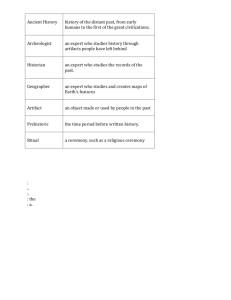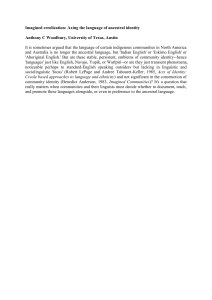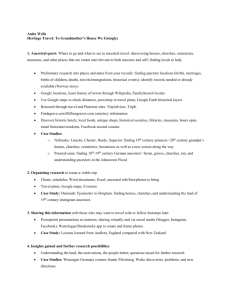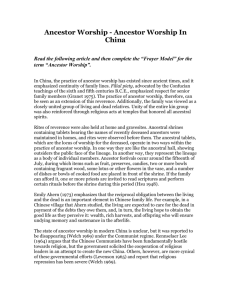Ancestral Worship Ceremony and Beyond
advertisement
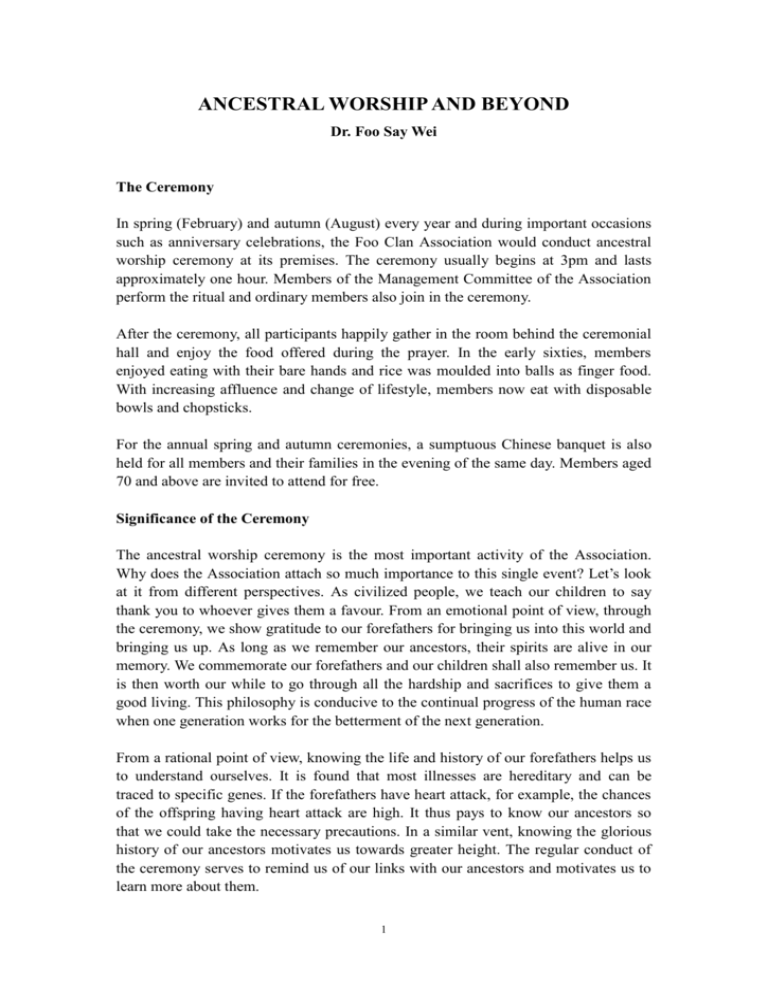
ANCESTRAL WORSHIP AND BEYOND Dr. Foo Say Wei The Ceremony In spring (February) and autumn (August) every year and during important occasions such as anniversary celebrations, the Foo Clan Association would conduct ancestral worship ceremony at its premises. The ceremony usually begins at 3pm and lasts approximately one hour. Members of the Management Committee of the Association perform the ritual and ordinary members also join in the ceremony. After the ceremony, all participants happily gather in the room behind the ceremonial hall and enjoy the food offered during the prayer. In the early sixties, members enjoyed eating with their bare hands and rice was moulded into balls as finger food. With increasing affluence and change of lifestyle, members now eat with disposable bowls and chopsticks. For the annual spring and autumn ceremonies, a sumptuous Chinese banquet is also held for all members and their families in the evening of the same day. Members aged 70 and above are invited to attend for free. Significance of the Ceremony The ancestral worship ceremony is the most important activity of the Association. Why does the Association attach so much importance to this single event? Let’s look at it from different perspectives. As civilized people, we teach our children to say thank you to whoever gives them a favour. From an emotional point of view, through the ceremony, we show gratitude to our forefathers for bringing us into this world and bringing us up. As long as we remember our ancestors, their spirits are alive in our memory. We commemorate our forefathers and our children shall also remember us. It is then worth our while to go through all the hardship and sacrifices to give them a good living. This philosophy is conducive to the continual progress of the human race when one generation works for the betterment of the next generation. From a rational point of view, knowing the life and history of our forefathers helps us to understand ourselves. It is found that most illnesses are hereditary and can be traced to specific genes. If the forefathers have heart attack, for example, the chances of the offspring having heart attack are high. It thus pays to know our ancestors so that we could take the necessary precautions. In a similar vent, knowing the glorious history of our ancestors motivates us towards greater height. The regular conduct of the ceremony serves to remind us of our links with our ancestors and motivates us to learn more about them. 1 So far, scientists have not found the answers to the birth of the universe, why life forms are developed and where does the human soul reside after death. In the territory of the unknown, there must be something called God that creates the universe and its life forms. Hence, for the ancestral worship ceremony, prayer to God always precedes prayer to ancestors. Similarly, we need not assume the existence of the souls of our ancestors for offering prayer to them, although most would like to think that they are spiritually alive and continue to protect us from above. The fear of death is both a driving and a depressing force. Through ancestral worship ceremony, we are conditioned to believe that the souls of our forefathers are alive. This serves to pacify our souls so that we can live our lives in this world more confidently, fully and meaningfully. Confucius said: just as we do not know our lives before birth, we also do not know where our souls are going after death. Confucius was reluctant to dwell on subjects relating to God and devils; he is nevertheless very supportive of ancestral worship. Although we do not know how our spirits are brought into this world, we know that our physical bodies are brought into this world by our parents. There is a specific period every year, the Ching Ming festival, for ancestral worship. It is customary for most families to give offerings to their direct ancestors during this period. Why then do we have to do it at the Association’s premises? Human beings are gregarious animals. They would form long queue to buy stuffed toys and purchase apartments. During the world cup tournament in 2002, people would rather go to the pub or outdoor premises and watch the football match with the crowd than watching it at the comfort of their own homes. From the Association’s point of view, ancestral worship ceremony will strengthen the ties among members as we have one common ancestor who was the first to adopt the surname. Through common activities, we get to know one another better. Such common activities also help to satisfy our social needs to do things together, to belong to a group of the same bloodline, and to have security in time of need. The Ritual The ritual adopted by our Association is adapted from the Taoist practice. Name tablets are used to signify the ancestors; offerings include food and daily necessities. Food consists of fish, crabs, chicken, suckling pig, rice, fruits, biscuits, tea and wine. Daily necessities include clothes and paradise notes. There is, however, variation of the practices adopted by our Association from those adopted by Foo Clan Association in Hainan Island, China where the founders of our Association came from. In Singapore, the participants wear long sleeved shirts and ties. They show respect to the ancestors by standing up and bowing. Whereas in Hainan Island, the participants put on long gown, kneel and kowtow to the ancestors. 2 The offerings in Hainan Island include goat whereas in Singapore we offer suckling pig. The forms and offerings may differ from place to place, but as long as the ceremony is carried out with sincerity, they should achieve the same purposes. Ancestral worship is not a religion by itself; it is simply a means to commemorate our forefathers for what they have done for us. The act of showing gratitude to our ancestors should have no conflict with reputable religions. Buddhists do not advocate killing and hence there is no animal in the offerings. Buddhists also do not believe in paper clothes and paradise money. However, Buddhism has been in practice in China for hundreds of years and in a certain way, Buddhists are tolerant to the practice of Taoism. Christian and Catholic also do not believe in animal offerings on the altar and their offerings consist mainly of wine and bread. The Muslims think that pork can get contaminated easily and hence prohibit the eating of pig. Our clan believes that we should offer to our ancestors what we ourselves like. Offerings such as food and necessities are more tangible and easily comprehended than offering of flowers alone. In the old days in China, the emperors will conduct ancestral worship ceremony regularly and in a building constructed specifically for the purpose. It was a grand occasion, with plenty of offerings and trappings. The idea is to ask for divine and ancestral protection of the country, so that the country can be prosperous and the people will have good lives. As emperors did it, so people followed. However, when Mao Ze Dong took over China, especially during the period of the Cultural Revolution, such elaborated ancestral worship ceremony was considered a waste of resources in the poor economic state of China then. With the influence of the Western culture, most people in the big cities have stopped offering animals to ancestors. Instead, flowers were used. But in the countryside of China, the Taoist practices are still followed. Language used in the Ceremony Our Clan Association was founded by forefathers who emigrated from Hainan Island, China. It is natural that the ritual and language used in the ceremony follow closely those adopted in Hainan Island. Our young generations are borne in Singapore and educated mainly with the western culture. The young generations may not have the same emotional attachment to China as those who come from there. Their mastery of the dialect, the Hainanese, is in no way comparable with their forefathers. If because of language, the young generation does not feel at ease with joining the activities organized by the Association, then in the long term, there will not be succession to the Association. Similarly, for Foo Clan world conferences in the future, if there is no common language among all the members, then translators have to be employed. This will also reduce the clanship among the members. 3 Root Seeking Trips According to historical record, the first person bearing the surname Foo is an official of Qing Shi Huan Ti about 2000 years ago and he lived in Shandong. Later, many of our ancestors who were government officials were given appointments to administer the various provinces including Hainan Island. For curiosity about our ancestors, their origin, their living conditions etc., some members of the Association made several trips to the Shandong province, China to find out more about our root. Up till today, we have gathered valuable facts, made connections with a few ‘newly discovered’ Foo’s villages, and established strong ties with many Chinese scholars and officials in Shandong province. When the path of migration of our ancestors from Shandong to Hainan is completely traced, our children and friends will be able to follow this path to better understand our root. Genealogy One of the prides of our clan is the preservation of a complete genealogy from first generation. In 1997, our leaders join hands with other leaders of the world to embark on the project to update the genealogy. The work is completed in 2003 and we are completely up-to-date in our records for those who care to participate. Why do we bother to spend so much time and effort to carry out such an arduous task? The reason is that we want to keep a record of our ancestors, the links and the bloodlines. We would also like to facilitate our descendents to find out their roots. In addition, to worship ancestors, we must know who they are. Growth of the Association In the ceremonial hall of our Association, there is a big name tablet of the first ancestor, Foo Gong Ya. There is also a tablet for the earth God. Members can pray to the ancestors and the earth God at any time. The earth God was given special tablet as all our food and necessities are produced on earth. Our younger generations are educated in Western culture. The religious believes of the younger generations vary and include Buddhism, Christianity and Catholic. Their views towards ancestral worship also differ. Some of the Foo Clan members, having suffered the hardship in their early days, perceived that a Western culture is the quick way to prosperity. They thought that ancestral worship, like mah-jong and smoking, is something old-fashioned and children need not follow their footpath. This creates a crisis of survival for the Association. In fact, many tend to confuse the adoption of new technology with the discard of old cultural practices. Perhaps we could look at Japan as an example. During the Meiji restoration, Japan adopted the Western ways of parliamentary systems, the Western technology, but it did not discard its traditional culture. In fact, it is said that the 4 strong social bond of the Japanese built on traditional culture, combined with the modern technology, are the reason of its rapid advances towards economic power. Ancestral worship has no negative correlation with economic progress. On the contrary, it helps in confidence building among the people. Also, to trace our root is what all of us should do. We should teach our children about the importance of knowing ones’ roots and to respect our elders. Recently, an organization with its origin in Japan has attracted a lot of members in Singapore, young and old and of different races to join in their practices. This organization puts high regards on ancestral worship. Ancestral worship is definitely different from mah-jong and smoking; it is a force to propel us to move forwards and upwards. We must encourage and facilitate all members and their family members to set aside one day a year to commemorate their forefathers. Owing to the small size of the hall, it cannot accommodate more than fifty persons at one time to take part in the ancestral worship ceremony. There are more participants at the banquets of the days of the ceremony. Perhaps we can take a minute or two during at least one of the banquets for all to join in a simple ceremony to commemorate our forefathers and to remind ourselves of our common ancestry. The simple ceremony will also serves the same purpose if it is done with sincerity and serenity and it suits those who do not like hour-long ceremony. Like all other clan associations, our Association also faces the problem of declining membership. There is an old saying that when we reach the limit of the path, we shall change and beat a new path. If the old forms and types of activities could not attract members, then it is time to change and create new styles and activities. To encourage all to participate in the activities organized by the Association, there must be varied activities, in addition to ancestral worship. Recently, we have the family day in 1999, dinner with show in Orchid Country Club in the millennium year, moon cake festival celebration for the children, scholarship awards for the students, and Karaoke facilities for all in the premises. To the elderly, we treat them to dinners twice a year. We also have lunar New Year celebration. The next step is to make these events more attractive to more members and their families. Conclusions Ancestral worship is a highly significant activity. The philosophy behind it serves to propel the human race, improving the quality of life from one generation to the next. Through such ceremony, we are more confident in our living and are motivated to achieve more. Ancestral worship is itself not a religion but an activity to commemorate our forefathers. The importance of such activity is unquestionable. What can be changed are the forms. We may change the way the ritual is conducted and the offerings to suit the time and the people. To conduct ancestral worship ceremony, to network with our fellow clansmen, to trace 5 and understand our roots, are important pursuits. These activities cannot be substituted or replaced by any other club or Association. As to what ritual to perform and what offerings to make, these can be changed through the years according to the taste and value system of the participants. The survival of the Association depends on its membership. The pulse of the Association depends on its activities. The growth of the Association depends on the structure of its council. I belief that under the organized efforts of our capable leaders, we would be able to continuously attract new members, and through purposeful activities, serve to unite the members for the common objectives. First published in December 2002. Modified May 2003. 6
